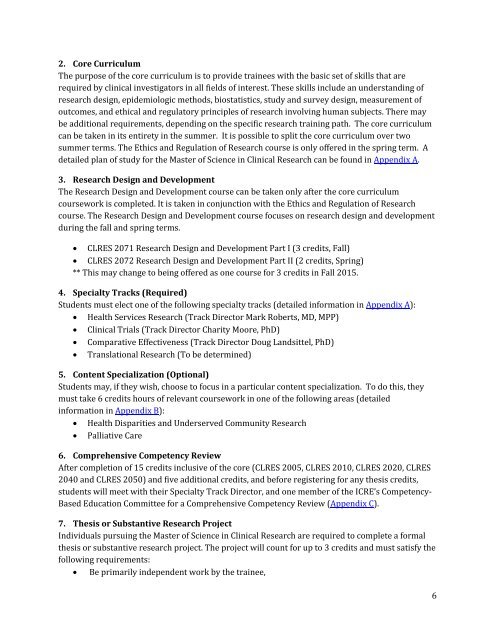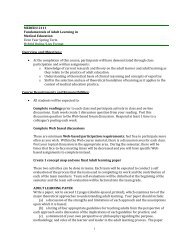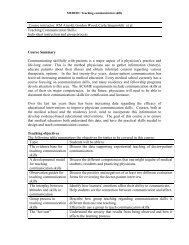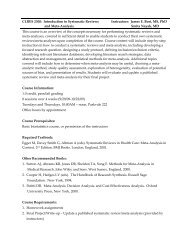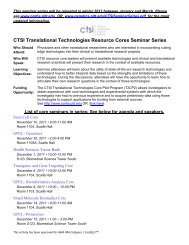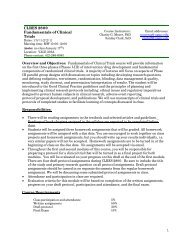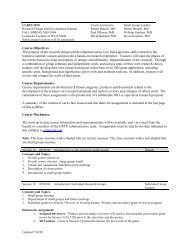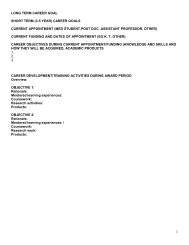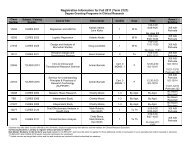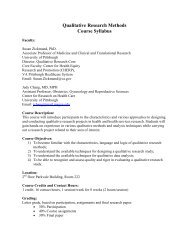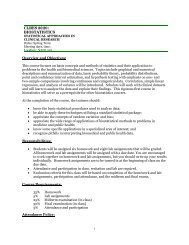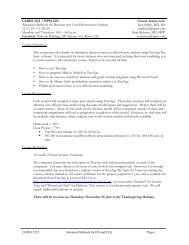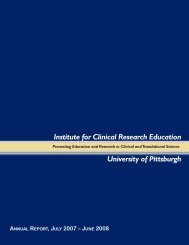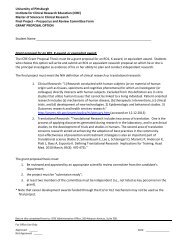Student Handbook - Institute for Clinical Research Education
Student Handbook - Institute for Clinical Research Education
Student Handbook - Institute for Clinical Research Education
Create successful ePaper yourself
Turn your PDF publications into a flip-book with our unique Google optimized e-Paper software.
2. Core Curriculum<br />
The purpose of the core curriculum is to provide trainees with the basic set of skills that are<br />
required by clinical investigators in all fields of interest. These skills include an understanding of<br />
research design, epidemiologic methods, biostatistics, study and survey design, measurement of<br />
outcomes, and ethical and regulatory principles of research involving human subjects. There may<br />
be additional requirements, depending on the specific research training path. The core curriculum<br />
can be taken in its entirety in the summer. It is possible to split the core curriculum over two<br />
summer terms. The Ethics and Regulation of <strong>Research</strong> course is only offered in the spring term. A<br />
detailed plan of study <strong>for</strong> the Master of Science in <strong>Clinical</strong> <strong>Research</strong> can be found in Appendix A.<br />
3. <strong>Research</strong> Design and Development<br />
The <strong>Research</strong> Design and Development course can be taken only after the core curriculum<br />
coursework is completed. It is taken in conjunction with the Ethics and Regulation of <strong>Research</strong><br />
course. The <strong>Research</strong> Design and Development course focuses on research design and development<br />
during the fall and spring terms.<br />
• CLRES 2071 <strong>Research</strong> Design and Development Part I (3 credits, Fall)<br />
• CLRES 2072 <strong>Research</strong> Design and Development Part II (2 credits, Spring)<br />
** This may change to being offered as one course <strong>for</strong> 3 credits in Fall 2015.<br />
4. Specialty Tracks (Required)<br />
<strong>Student</strong>s must elect one of the following specialty tracks (detailed in<strong>for</strong>mation in Appendix A):<br />
• Health Services <strong>Research</strong> (Track Director Mark Roberts, MD, MPP)<br />
• <strong>Clinical</strong> Trials (Track Director Charity Moore, PhD)<br />
• Comparative Effectiveness (Track Director Doug Landsittel, PhD)<br />
• Translational <strong>Research</strong> (To be determined)<br />
5. Content Specialization (Optional)<br />
<strong>Student</strong>s may, if they wish, choose to focus in a particular content specialization. To do this, they<br />
must take 6 credits hours of relevant coursework in one of the following areas (detailed<br />
in<strong>for</strong>mation in Appendix B):<br />
• Health Disparities and Underserved Community <strong>Research</strong><br />
• Palliative Care<br />
6. Comprehensive Competency Review<br />
After completion of 15 credits inclusive of the core (CLRES 2005, CLRES 2010, CLRES 2020, CLRES<br />
2040 and CLRES 2050) and five additional credits, and be<strong>for</strong>e registering <strong>for</strong> any thesis credits,<br />
students will meet with their Specialty Track Director, and one member of the ICRE’s Competency-<br />
Based <strong>Education</strong> Committee <strong>for</strong> a Comprehensive Competency Review (Appendix C).<br />
7. Thesis or Substantive <strong>Research</strong> Project<br />
Individuals pursuing the Master of Science in <strong>Clinical</strong> <strong>Research</strong> are required to complete a <strong>for</strong>mal<br />
thesis or substantive research project. The project will count <strong>for</strong> up to 3 credits and must satisfy the<br />
following requirements:<br />
• Be primarily independent work by the trainee,<br />
6


